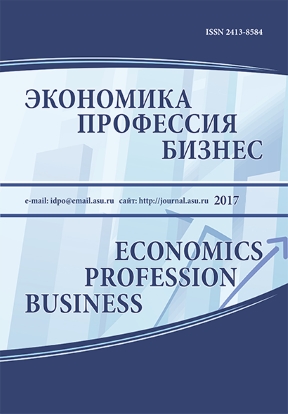МОБИЛЬНОСТЬ ТРУДОВЫХ РЕСУРСОВ КАК КЛЮЧЕВОЙ ФАКТОР ЭКОНОМИЧЕСКОГО РОСТА В УСЛОВИЯХ АГЛОМЕРАЦИИ
Abstract
Статья посвящена изучению роли рынка труда в анализе местных условий производства. Трудовые ресурсы и их относительная неподвижность и подвижность в пространстве рассматриваются в качестве ключевого атрибута для обеспечения более обобщенного понимания местных условий производства. Это стало возможным с помощью изменения фокуса изучения и применения количественных методов анализа производительности на всей территории национальной экономики, а не только анализа влияния региональных компаний, фирм и их сотрудников.В статье показано, что при относительной фиксированности мобильность трудовых ресурсов занимает центральное место в современной теории местоположения. Очевидно, что локальный контекст имеет значение для понимания географических различий экономического роста в части специализации и диверсификации.Целью данной работы является анализ влияния мобильности трудовых ресурсов на рост производительности. Что, в свою очередь, может помочь определить новые направления исследований в области изучения экономических последствий размещения.Downloads
Metrics
References
Malmberg A. Beyond The Cluster — Local Milieus and Global Connections. In: J. Peck and H. W. C. Yeung (eds.) Remaking the Global Economy. London: Sage Publications, 2003. pp. 145–162.
Parr J. B. Missing elements in the analysis of agglomeration economies, International Regional Science Review, 2002. Pp. 151–168.
Parr J. B. Agglomeration economies: ambiguities and confusions, Environment and Planning A, 2002. Pp. 717–731.
Строителева Т. Г. Новые подходы к разработке кадровой политики предприятий Алтайского края, определяющиеся условиями экономического роста // Управление персоналом. 2008. № 9. С. 45–48.
Строителева Е. В. Конкурентные преимущества развивающихся регионов // Вестник Алтайской академии экономики и права. 2014. № 2 (34). С. 78–81.
REFERENCES
Malmberg A. (2003) Beyond The Cluster — Local Milieus and Global Connections. In: J. Peck and H. W. C. Yeung (eds.) Remaking the Global Economy. London: Sage Publications. pp. 145–162.
Parr J. B. (2002) Missing elements in the analysis of agglomeration economies, International Regional Science Review. Pp. 151–168.
Parr J. B. (2002) Agglomeration economies: ambiguities and confusions, Environment and Planning A. Pp. 717–731.
Stroiteleva T. G. (2008) Novye podkhody k razrabotke kadrovoy politiki predpriyatiy Altayskogo kraya, opredelyayushchiesya usloviyami ekonomicheskogo rosta // Personnel Management. № 9. P. 45–48 (in Russian).
Stroiteleva E. V. (2014) Konkurentnye preimushchestva razvivayushchikhsya regionov // Vestnik of Altai Academy of Economics and Law. № 2 (34). P. 78–81 (in Russian).
Copyright (c) 2017 Economics Profession Business

This work is licensed under a Creative Commons Attribution 4.0 International License.
Economics Profession Business is a golden publisher, as we allow self-archiving, but most importantly we are fully transparent about your rights.
Authors may present and discuss their findings ahead of publication: at biological or scientific conferences, on preprint servers, in public databases, and in blogs, wikis, tweets, and other informal communication channels.
Economics Profession Business (EPB) allows authors to deposit manuscripts (currently under review or those for intended submission to EPB) in non-commercial, pre-print servers such as ArXiv.
Authors who publish with this journal agree to the following terms:
- Authors retain copyright and grant the journal right of first publication with the work simultaneously licensed under a Creative Commons Attribution License that allows others to share the work with an acknowledgement of the work's authorship and initial publication in this journal.
- Authors are able to enter into separate, additional contractual arrangements for the non-exclusive distribution of the journal's published version of the work (e.g., post it to an institutional repository or publish it in a book), with an acknowledgement of its initial publication in this journal.
- Authors are permitted and encouraged to post their work online (e.g., in institutional repositories or on their website) prior to and during the submission process, as it can lead to productive exchanges, as well as earlier and greater citation of published work (See The Effect of Open Access).









